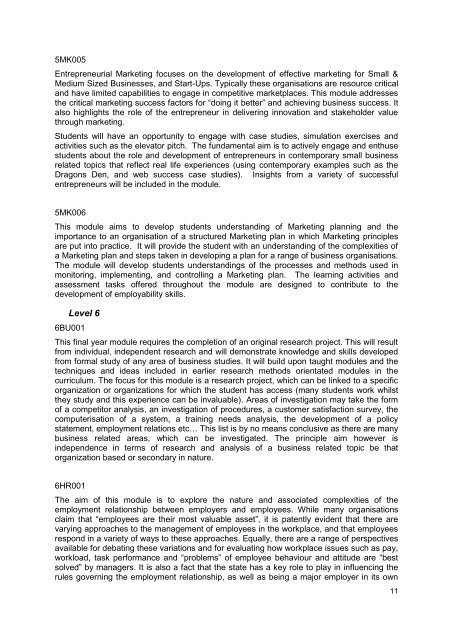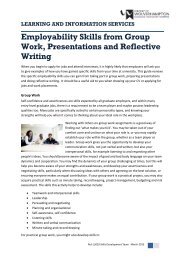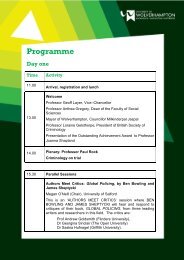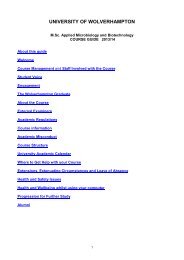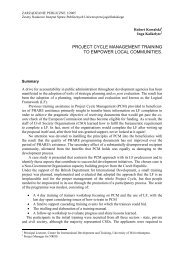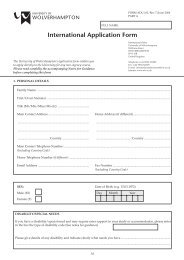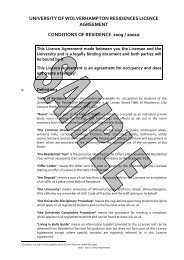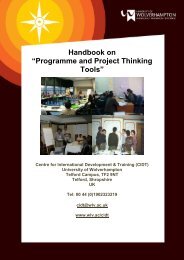(Hons) Marketing Management and Human Resource Management
(Hons) Marketing Management and Human Resource Management
(Hons) Marketing Management and Human Resource Management
You also want an ePaper? Increase the reach of your titles
YUMPU automatically turns print PDFs into web optimized ePapers that Google loves.
5MK005<br />
Entrepreneurial <strong>Marketing</strong> focuses on the development of effective marketing for Small &<br />
Medium Sized Businesses, <strong>and</strong> Start-Ups. Typically these organisations are resource critical<br />
<strong>and</strong> have limited capabilities to engage in competitive marketplaces. This module addresses<br />
the critical marketing success factors for “doing it better” <strong>and</strong> achieving business success. It<br />
also highlights the role of the entrepreneur in delivering innovation <strong>and</strong> stakeholder value<br />
through marketing.<br />
Students will have an opportunity to engage with case studies, simulation exercises <strong>and</strong><br />
activities such as the elevator pitch. The fundamental aim is to actively engage <strong>and</strong> enthuse<br />
students about the role <strong>and</strong> development of entrepreneurs in contemporary small business<br />
related topics that reflect real life experiences (using contemporary examples such as the<br />
Dragons Den, <strong>and</strong> web success case studies). Insights from a variety of successful<br />
entrepreneurs will be included in the module.<br />
5MK006<br />
This module aims to develop students underst<strong>and</strong>ing of <strong>Marketing</strong> planning <strong>and</strong> the<br />
importance to an organisation of a structured <strong>Marketing</strong> plan in which <strong>Marketing</strong> principles<br />
are put into practice. It will provide the student with an underst<strong>and</strong>ing of the complexities of<br />
a <strong>Marketing</strong> plan <strong>and</strong> steps taken in developing a plan for a range of business organisations.<br />
The module will develop students underst<strong>and</strong>ings of the processes <strong>and</strong> methods used in<br />
monitoring, implementing, <strong>and</strong> controlling a <strong>Marketing</strong> plan. The learning activities <strong>and</strong><br />
assessment tasks offered throughout the module are designed to contribute to the<br />
development of employability skills.<br />
Level 6<br />
6BU001<br />
This final year module requires the completion of an original research project. This will result<br />
from individual, independent research <strong>and</strong> will demonstrate knowledge <strong>and</strong> skills developed<br />
from formal study of any area of business studies. It will build upon taught modules <strong>and</strong> the<br />
techniques <strong>and</strong> ideas included in earlier research methods orientated modules in the<br />
curriculum. The focus for this module is a research project, which can be linked to a specific<br />
organization or organizations for which the student has access (many students work whilst<br />
they study <strong>and</strong> this experience can be invaluable). Areas of investigation may take the form<br />
of a competitor analysis, an investigation of procedures, a customer satisfaction survey, the<br />
computerisation of a system, a training needs analysis, the development of a policy<br />
statement, employment relations etc… This list is by no means conclusive as there are many<br />
business related areas, which can be investigated. The principle aim however is<br />
independence in terms of research <strong>and</strong> analysis of a business related topic be that<br />
organization based or secondary in nature.<br />
6HR001<br />
The aim of this module is to explore the nature <strong>and</strong> associated complexities of the<br />
employment relationship between employers <strong>and</strong> employees. While many organisations<br />
claim that “employees are their most valuable asset”, it is patently evident that there are<br />
varying approaches to the management of employees in the workplace, <strong>and</strong> that employees<br />
respond in a variety of ways to these approaches. Equally, there are a range of perspectives<br />
available for debating these variations <strong>and</strong> for evaluating how workplace issues such as pay,<br />
workload, task performance <strong>and</strong> “problems” of employee behaviour <strong>and</strong> attitude are “best<br />
solved” by managers. It is also a fact that the state has a key role to play in influencing the<br />
rules governing the employment relationship, as well as being a major employer in its own<br />
11


